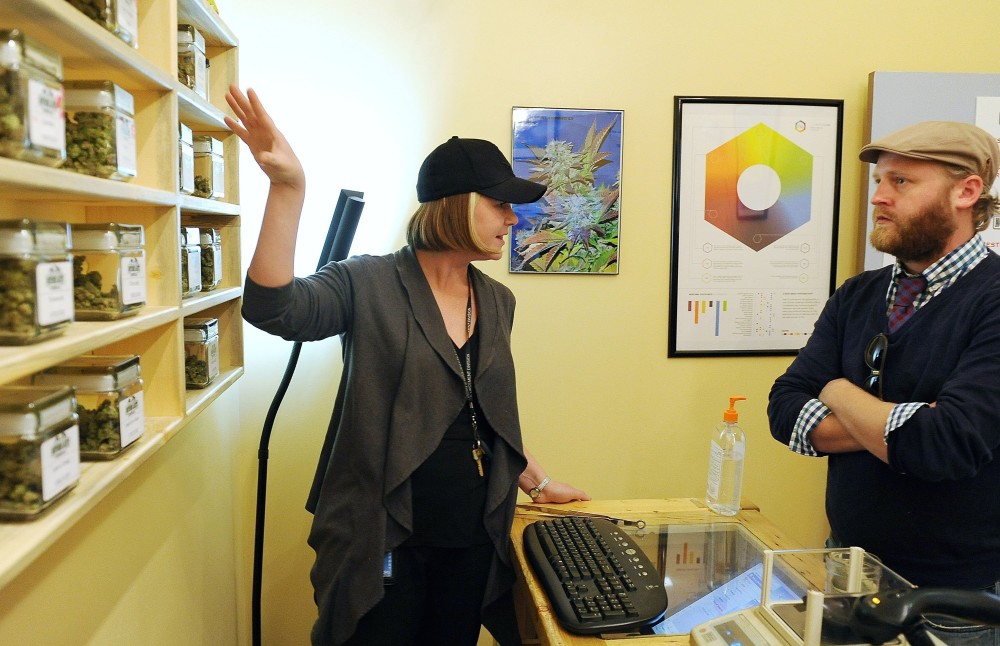By Noelle Crombie
The Oregonian, Portland, Ore.
One of the fastest-growing marijuana business groups in Oregon is dedicated to the idea that women should play a leading role in the state’s burgeoning industry.
Women Grow, founded by women in Denver, has 30 chapters nationwide, but its fastest-growing is in Portland. The local chapter is headed by Leah Maurer and Sara Batterby, CEO of a Portland company that grows cannabis. Maurer’s husband, Travis, helped spearhead the Measure 91 campaign.
The group’s next event is at 6 p.m Thursday at Jacobsen Salt in Southeast Portland. U.S. Rep. Earl Blumenauer will give the keynote address for the event. (Tickets are $25 and available only in advance; no tickets will be sold at the door.)
Maurer sat down with The Oregonian/OregonLive this week to talk about Women Grow and the role of women in the marijuana industry. (This interview has been edited for length and clarity.)
Q: Why do you think the Portland chapter is so popular?
A: A big part of it is where Oregon is at right now. A lot of the people that were heavily embedded in the medical industry that weren’t as vocal about what they were doing can be out of the “cannabis closet.” You have this huge new influx of people who have these great entrepreneurial ideas for marijuana. People want to become more educated about the industry and the plant that are stepping up their game to come to events to network with other people in the industry.
One of the things we are trying to do with women grow is make sure the playing field is level and that women have a strong presence — and that it’s very diverse not just in terms of gender but in terms of age and race.
Q: What do Women Grow events look like?
A: They are going to feel and look like any other networking event, whether you are in the software industry or a lawyers association. People are dressed nicely. They have their business cards in one hand and a glass of wine or bubbly water in the other. People are surprised. I think they have a stereotype and they (think they) are going to be in a big smoky room and someone is going to get on a stage and say, “Rah, rah. It’s legal here!” But that’s not what we do. We try to make sure people who come make meaningful connections and that our programming is really meaningful.
Q: What are some of the most common questions you’re asked?
A: I have been a stay-at-home mom for 10 years. Most of the people I am around are people who are not in the industry. I don’t want to say “normal,” but people who have normal jobs and maybe like to use marijuana on occasion. So the question I get the most is, “What are you telling your kids?”
Q: And how do you answer?
A: I talk to my children about it the same way I talk about cars or guns or household cleaners or alcohol or cigarettes. I talk about it in a very factual, science-based way. I tell them it’s a plant and that people extract it and use it in a variety of ways. There are people who use it as medicine. I have been really honest with them that there are children out there that use this as medicine because they have serious disorders, but I also tell them that marijuana is also used recreationally and it’s only safe for adults to use it that way. Once their initial curiosity is satisfied, they tend to drop it because it’s not taboo to them anymore.
Q: Women have generally been underrepresented in the marijuana industry. Do you see a shift underway?
A: I see a real shift. I think this is a really good time to really level the playing field. One of our huge goals with Women Grow is that women who have an excellent idea or are trying to gain clients as an accountant or a lawyer feel supported, that we can connect them with other women and other people in the industry so that women can have a strong voice in this industry.
What is different about the marijuana industry right now is that (recreational) sales are still on the horizon. That part of the industry is still very, very new and still emerging. If women have an idea or they are just curious about what’s out there, I would encourage them to investigate it.
Q: Walk into some dispensaries in Oregon and you still see young attractive women behind the counter. What do you make of that image?
buy valif generic buy valif online no prescription
A: I think that’s outdated. As far as marketing we will continue to see women’s bodies used because we see women’s bodies used across other industries as well. What we are trying to do is break that down and fight that image. If that image exists, that’s OK, but we want the image of the strong businesswoman who is running this law firm or running this dispensary or this (marijuana) farm to be more prevalent than that sex symbol that people have of women or the cute budtenders with the tank top and the trucker hat.














































































































































































































































































































































































